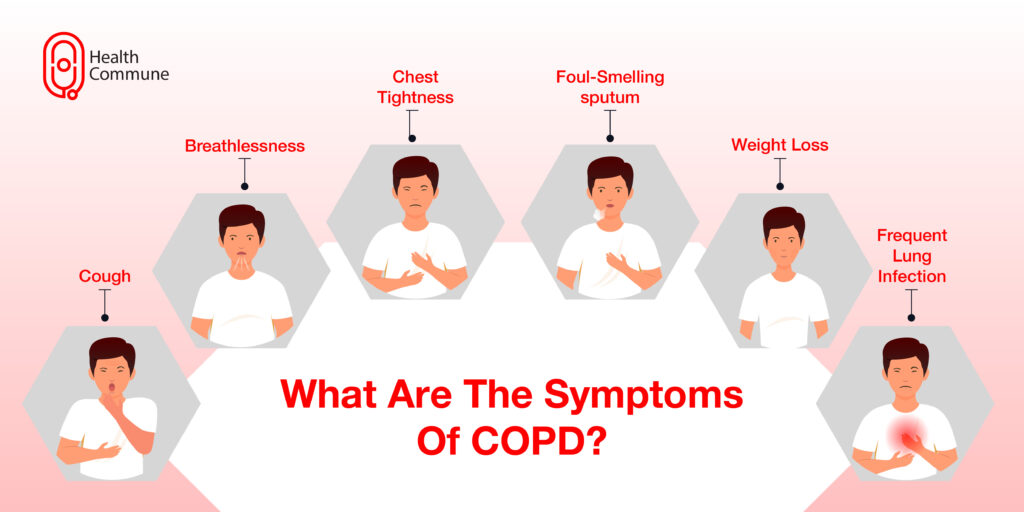COPD affects approximately 55 million people in India and is the second most common cause of death in the country among all non-communicable diseases. Get information on what it is, its symptoms, risk factors, and how it is diagnosed, treated, and prevented.
What is COPD?
COPD (chronic obstructive pulmonary disease) is a group of respiratory diseases in which there is obstruction to the airflow in the lungs, making it difficult to breathe. This is an umbrella term for various conditions including:
- Emphysema: In this, the air sacs (alveoli) in your lungs and their walls get abnormally enlarged and damaged
- Chronic bronchitis: If you had a chronic cough with sputum production for 3 months, or 2 years in a row, and doctors cannot find any other reason for your cough, you have chronic bronchitis.
What are the risk factors for COPD?
Some common risk factors include:
- Cigarette smoking: This is the most important risk factor and it directly correlates with how long and how much you smoke
- Second-hand smoke or passively inhaling smoke
- Air pollution
- Using biomass fuels such as firewood, cow dung, and kerosene etc.
- Exposure to dust such as coal dust, and silica
- Repeated lung infections
- Cannabis smoking
- Bronchopulmonary dysplasia in babies or babies with low birth weight
- Smoking while pregnant can affect your child’s lung growth later in life as well
- Genetic conditions like alpha-1-antitrypsin deficiency
How is COPD caused?
What are the symptoms of COPD?
Symptoms usually include:
- Cough
- Foul-smelling sputum
- Breathlessness
- Frequent lung infections
- Tightness in your chest
- Easy fatiguability
- Swelling of the feet
- Weight loss (as your disease progresses)

Do I need to see a doctor for my COPD?
- Symptoms that have gotten worse than usual
- Shortness of breath even while just sitting or lying down
- Light-headedness or blurring of vision
- Bluing of your fingers or toes
How is COPD diagnosed?
- Spirometry: This is used to assess your lung function. You’ll be asked to breathe in and out of a tube. This measures how much air you can inhale and exhale, as well as how quickly you exhale
- Chest X-ray: If you’re suffering from emphysema, your chest X-ray will show specific lung changes such as overinflated lungs, and flattened diaphragm
- CT scan: This is also useful for diagnosing and gauging the progress of your emphysema
- Arterial blood gas (ABG) study: This is a test measures the amount of oxygen, carbon dioxide and pH in your blood.
- ECG: If you’re suffering from advanced stages of the disease, an ECG can help detect signs of right heart failure
- Blood testing: This can be useful in detecting genetic conditions like alpha-1-antitrypsin deficiency
How is COPD treated?
To reduce your symptoms, progression of the disease, and prevent disease complications, your doctor can prescribe:
- Lifestyle modifications:
- Stop smoking completely
- Regularly exercise
- Consume a well-balanced, protein-rich diet
Medicines :
- Bronchodilators: These drugs act on the beta receptors present in the lungs and cause the muscles of the airways to relax, thereby allowing more air to enter and providing relief from breathlessness. These include:
- Beta-agonists
- Antimuscarinic drugs
- Phosphodiesterase type 4 inhibitors: These have anti-inflammatory properties that help provide relief against the symptoms and relax the airways
- Corticosteroids: These are anti-inflammatory agents that can either be taken orally or through an inhaler. They reduce the frequency and severity of the symptoms
- Antibiotics: These are given in the case of a respiratory infection and can be taken either by mouth or injected into the vein
- Diuretics: Very advanced cases may experience right heart failure. Diuretics reduce the amount of water and sodium in your body, consequently reducing the pressure on your heart.
- Anti-mucolytic agents: These help reduce the thickness of the sputum and provide relief from symptoms
- Oxygen therapy: In case you’re having difficulty breathing during exertion or at night while sleeping, your doctor can connect you to a nasal cannula to help you breathe
- Mechanical ventilation: This can be either through a face mask or by intubation
- Chest physiotherapy and breathing techniques to manage breathlessness, cope with your symptoms and improve your quality of life
- Surgery: In advanced cases, you may be recommended
- Lung volume reduction surgery
- Lung transplant
What are the complications of COPD?
- Recurrent pulmonary infections
- Pneumonia
- Carbon dioxide retention, can manifest as headache, drowsiness, and altered behaviour
- Respiratory failure
- Right-sided heart failure
- Deep vein thrombosis
- Pulmonary embolism
- Lung cancer
What are some health conditions associated with COPD?
COPD is associated with numerous other health conditions such as:
- Pulmonary hypertension, where the blood pressure in your lungs becomes too high
- Right heart failure
- Increased risk of heart attack, stroke, and peripheral vascular disease
- Muscular dysfunction and considerable muscle wasting
- Osteoporosis
- Sleep disorders
- Sexual dysfunction
- Depression and anxiety
Can I prevent COPD?
COPD is a preventable condition. Some measures you can take to prevent and slow the progression of this condition are:
- Quitting smoking
- Reduce exposure to air pollution, dust, and chemicals
- Get vaccinated against influenza and pneumonia




